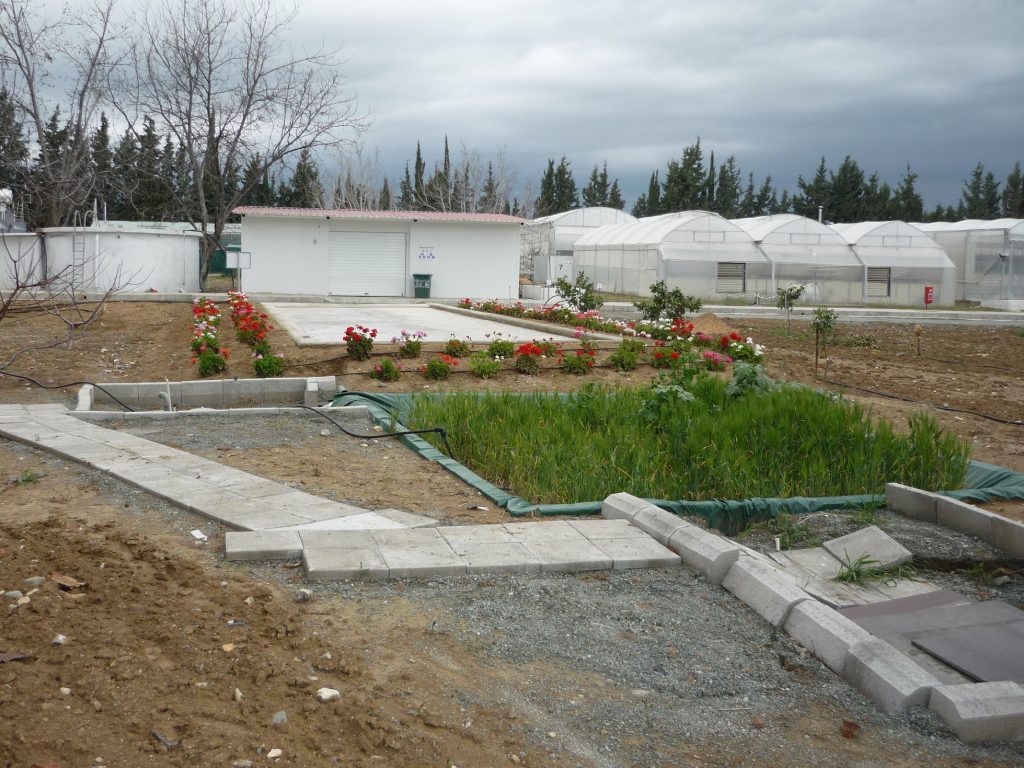" Point source contamination accounts for more than 60% of the contamination of natural water resources with pesticides. Point source pollution could be the result of non orthodox activities (before, during or after spraying preparation) at on farm level. In order to minimize point source contamination of pesticides on farm biodepuration systems called biobeds were implemented initially in northern Europe. Off-farm agro-industrial activities like the application of fungicides in fruit packaging plants, the use of fungicides for seed-coating and the disinfestations of bulbs by dipping in fungicide solutions result in the formation of pesticide-contaminated effluents whose direct environmental discharge constitute a major point source for the pollution of water systems. Initial work has focused on small fruit-packaging plants while current interests focus:
(i) on expanding the use of biobeds for the treatment of pesticide-contaminated effluents produced by other agricultural industries (i.e. bulp-dipping or pesticide-seed coating)
(ii) on the implementation of biobed systems at on-farm scale in Greece
(iii) on exploring the microbial dynamics and interactions in biobed systems since current data by our group and others have identified biobeds as hot-spots for evolution of novel catabolic traits through horizontal gene transfer

Funding
- Research Project DESMI, Evaluation of biobeds for the decontamination of wastewater of agroindustrial origin, Funding Body: Research Promotion Foundation of Cyprus, Duration: 1/12/2008 – 31/3/2011, Website: http://biobeds.foodlab.com.cy/
- Targeted Research Activities Call, Biobeds: minimizing point source contamination of natural water resources of Thessaly by the wastewaters of the fruit packaging plants.Funding body: Research Committee of the University of Thessaly, Duration: 1/6/2013-31/5/2015
- State Scholarship Foundation of Greece, Call Siemens Postdoctoral Fellowships, Title: Evaluation of biobeds for the biological detoxification of pesticides contained in agro-industrial effluents. Funding body: State Scholarship Foundation of Greece, Funding 18000 €, Duration 1.1.2017-31.8.2017, Benefited Fellow: Dr P. Karas
- State Scholarship Foundation of Greece, Call PhD students fellowships, Title: Study of the efficiency and microbiology of biobed systems receiving pesticide-contaminated effluents produced by agro-food industrial activities. Funding Body: State Scholarship Foundation of Greece, Duration: 2018-2020, Benefited Student: C. Papazlatani



Publications
- Kravariti K., Tsiropoulos N., Karpouzas D.G., (2010) Terbuthylazine and chlorpyrifos fate in various biomix substrates originated from composted cotton crop residues. Pest Management Science 66 (10): 1122-1128
- Karanasios E, Tsiropoulos N, Karpouzas D.G., Menkissoglu-Spiroudi U., (2010) Novel biomixtures based on local Mediterranean ligninocellulosic materials: evaluation for use in biobeds. Chemosphere 80: 914-921
- Karanasios, E., Tsiropoulos, N., Karpouzas, D.G., Ehaliotis C., (2010) Degradation and adsorption of pesticides in compost-based biomixtures as potential substrates for biobeds in south Europe. Journal of Agricultural and Food Chemistry 58: 9147-9156
- Karas P., Perucchon C., Exarhou C., Ehaliotis C., Karpouzas DG., (2011) Potential for bioremediation of agro-industrial effluents with high loads of pesticides by selected fungi. Biodegradation 22: 215-228
- De Wilde, T., Capri E., Hunsby J, Castillo M.d.P., Karpouzas D.G., Nilsson E., Spliid N.H., (2011) 3rd European biobed workshop. Environmental Science and Pollution Research 18(1): 132-134
- Karanasios E., Karpouzas D.G., Tsiropoulos N., (2012) Key parameters and pesticide practices controlling pesticide degradation efficiency of biobed substrates. Journal of Environmental Science and Health PartB 47(6): 589-598
- Omirou M, Dalias P., Costa C., Papastefanou C., Dados A., Ehaliotis C., Karpouzas D.G., (2012) Exploring the potential of biobeds for the depuration of pesticide-contaminated wastewaters from the citrus production industry: laboratory, column and field studies. Environmental Pollution 166: 31-39
- Karanasios E., Papadi-Psyllou A., Karpouzas D.G., Tsiropoulos N. (2012) Optimization of water management and biomixture composition for maximizing the pesticide depuration of peat-free biobed systems. Journal of Environmental Quality 41(6): 1787-1795
- Karanasios E. Tsiropoulos N. Karpouzas D.G., (2012) On-farm biopurification systems for the depuration of pesticide-wastewaters: recent advances and future perspectives. Biodegradation 23(6): 787-802
- Rayu S., Karpouzas D.G., Singh B.K. (2012) Emerging technologies in bioremediation: constraints and opportunities. Biodegradation 23(6): 917-926
- Karanasios E., Karpouzas D.G., Tsiropoulos N., (2013) Quantitative and qualitative differences in the metabolism of pesticides in biobed substrates and soil. Chemosphere 93(1): 20-28
- Marinozzi M, Coppola L., Monaci E, Karpouzas D.G., Papadopoulou E, Menkissoglu-Spiroudi U., Vischetti C., (2013) The dissipation of three fungicides in a biobed organic substrate and their impact on the structure and activity of the microbial community. Environmental Science and Pollution Research 20:2546-2555
- Karas P., Metsoviti A., Zisis V., Ehaliotis C., Omirou M., Papadopoulou ES., Menksissoglu-Spiroudi U., Manta S., Komioti D., Karpouzas D.G., (2015) Dissipation, metabolism and sorption of pesticides used in fruit-packaging plants: Towards an optimized depuration of their pesticide-contaminated agro-industrial effluents. Science Total Environment 530-531: 129-139
- Karas P.A, Makri S., Papadopoulou E.S, Ehaliotis C., Menkissoglu-Spiroudi U., Karpouzas D.G., (2016) The potential of organic substrates based on mushroom substrate and straw to dissipate fungicides contained in effluents from the fruit-packaging industry – Is there a role for Pleurotus ostreatus. Ecotoxicology and Environmental Safety 124: 447-454
- Karas P.A. Perruchon C., Karanasios E., Papadopoulou E.S, Manthou E., Sitra., S., Ehaliotis C., Karpouzas D.G., (2016) Integrated biodepuration of pesticide-contaminated wastewaters from the fruit-packaging industry: Bioaugmentation, risk assessment and optimized management. Journal of Hazardous Materials 320: 635-644
- Campos M., Perruchon C., Karavasilis D., Diez M.C., Karpouzas D.G., (2017) Biodegradation and rhizosphere-assisted bioaugmentation as strategies for optimization of the dissipation capacity of biobeds. Journal of Environmental Management 187(1): 103-110
- Elgueta S., Correa A., Campo M., Gallardo F., Karpouzas D.G., Diez MC. (2017) Atrazine, chlorpyrifos, and iprodione effect on the biodiversity of bacteria, actinomycetes, and fungi in a pilot biopurification system with a green cover. Journal of Environmental Science and Health Part B, Pesticides Food Contaminants and Agricultural Wastes 52(9): 651-657
- Papazlatani CV., Karas P.A., Tucat G., Karpouzas D.G., (2019) Expanding the use of biobeds: Dissipation and adsorption of pesticides contained in effluents from seed-coating, bulb disinfestation and fruit-packaging activities. Journal of Environmental Management 248: 15 October 2019, 109221 https://doi.org/10.1016/j.jenvman.2019.06.122
Personnel
- Dr Panagiotis Karas, Postdoctoral fellow
- Christina Papazlatani, PhD student